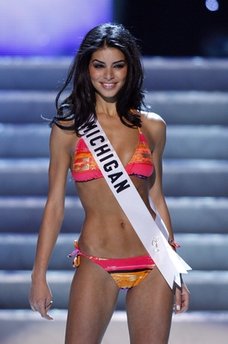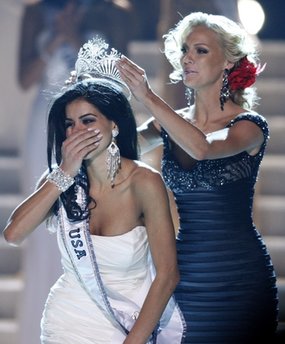
During a brief stop in Houston this week, the newly crowned Miss USA said she hopes her new profile will help expand the notion of what it means to be a Muslim American.
“My crown is history making,” said Fakih, 24, who was named Miss USA on May 16 in Las Vegas. “Many people don’t understand the support I’ve received from the Muslim community. Hopefully, I can show an image beyond the stereotypes. No more judging by what you see on TV.”
“This isn’t your grandmother’s beauty pageant,” she said. “We all wear bikinis.”
At a time when many Americans view Muslims with suspicion and hostility, Fakih, 24, sees herself as a testament to America’s promise as a land of opportunity. Though she insists religion does not define her, the erstwhile Miss Michigan also recognizes she can challenge stereotypes of the cloaked and dour Muslim woman.
Q: What role did religion play in your and your family’s life?
A: We’re more of a spiritual family. Religion really doesn’t define me or my family. My family’s been very liberal, and we appreciate all different kinds of religions.
Q: Could you elaborate?
A: I consider myself to be blessed. I have a family that is a mix of different religions and different ethnicities. My brother-in-law is Christian, and he (and my sister) baptized their two sons. I have an uncle who converted to Christianity, and he’s a priest now. My family is Muslim. We don’t look at religion as something that defines us, we look at religion as something that we respect and something that teaches us about ethics.

A: We’d go to church on Easter. We always had a Christmas tree, and every year we go to the Radio City Christmas Show, and watch The Miracle on 34th Street. But we celebrate some of the Islamic holidays as well.
When I went to the University of Michigan, because there’s more of a Muslim community, my dad wanted me to learn more about Islam. I didn’t know much about Ramadan and other holidays, and my dad wanted me to take that opportunity and learn.
Q: With all these different influences, did you ever struggle with your identity?
A: No. My father always told it like this: We’re from Lebanon, Lebanon is our mother. But we look at America as our adoptive mother.
And we were never confused on any point because my dad was someone who always had stories and lessons. I think that’s also why he sent us to Catholic school, just because he thought Catholic school would help us learn about how to be good, ethical human beings.
Q: Though you don’t define yourself by religion, did you still face questions about or hostility because of your Muslim background?
A: Oh, yeah. People were always asking, “Is your family OK with this? Do you know what you’re doing?” They always assume I’m going behind my family’s back, but my family is my biggest supporter.
I hope everyone can look beyond the bikini or beyond the whole beauty-pageant stereotype and realize that what I’m doing is more significant than just that. It represents the United States as a country of opportunity, where you can do anything you want to, and ethnicity and religion cannot stop you.
Q: What do you make of the accusations on the blogosphere that your family is somehow connected to Hezbollah?
A: It’s absolutely false. My family — just like anyone else from any other ethnicity — is a family going through stereotypes, where people are going to hate, they’re going to say this person should not be here. Every ethnicity has had racist remarks and prejudice against them. But I’m proud because everyone who goes through what I’m going through right now, you learn things that will carry on for the rest of your life.
Houston Chronicle

Leave a Reply
You must be logged in to post a comment.